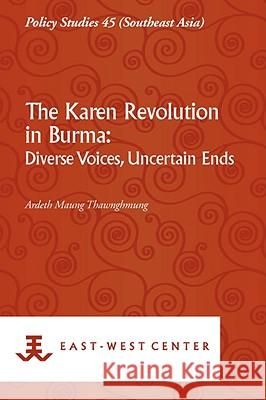The Karen Revolution in Burma: Diverse Voices, Uncertain Ends » książka
The Karen Revolution in Burma: Diverse Voices, Uncertain Ends
ISBN-13: 9789812308047 / Angielski / Miękka / 2008 / 81 str.
This study analyzes the various types and stages of conflict that have been experienced by diverse groups and generations of Karen over the six decades of armed conflict between the Karen National Union (KNU) and successive Burmese governments. Instead of focusing on those who are internally displaced, those in the refugee camps on the Thai-Burma border or living abroad, or those in the KNU, it places particular emphasis on the 'other' Karen - the majority segment of the Karen population living inside Burma - a population that has hitherto received little scholarly and journalistic attention. It also assesses the Karen people's varied attitudes towards a number of political organizations that claim to represent their interests, towards successive Burmese military regimes, and towards the political issues that led to the original divide between the 'accommodators' and 'rebels'. This study argues that the lifestyles and strategies that the Karens have pursued are diverse and not confined to armed resistance. Acknowledging these multiple voices will not only shed light upon the many positive features of ethnic interactions, including harmonious communal relationships and significant attempts to promote peace and stability by encouraging 'normal' activities and routines in both peaceful and war-torn areas; it will also help to identify policy recommendations for future ceasefire negotiations and a possible long-term political settlement within the context of a militarised Burma.











